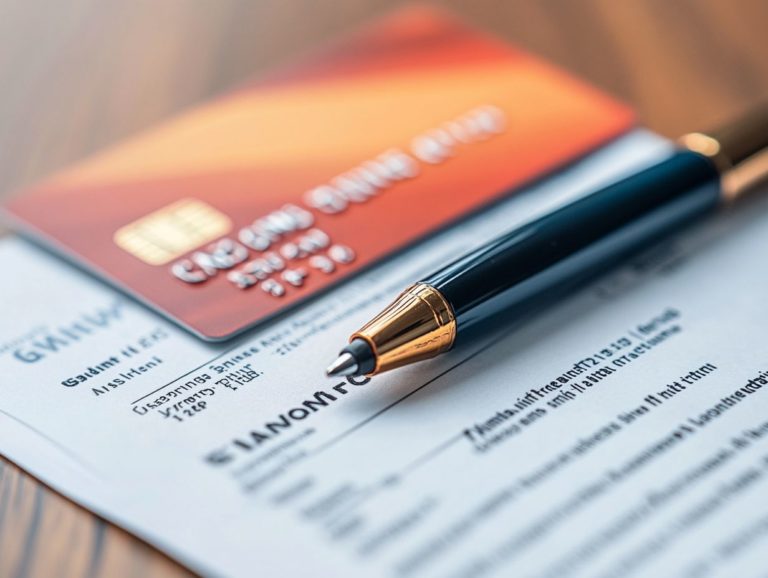How to Avoid Closing Old Credit Cards?
Closing old credit cards may seem like a simple decision, but it can have significant implications for your credit score and financial future. You might not fully understand how this seemingly innocuous action can affect your credit history and overall well-being.
This article explores the potential consequences of closing old accounts, considers alternatives, and offers practical steps to take before making a decision. It also provides insights on effectively closing cards and strategies for rebuilding your credit afterward.
By understanding these factors, you will be empowered to make informed choices regarding your credit.
Contents
- Key Takeaways:
- Understanding the Impact of Closing Old Credit Cards
- Alternatives to Closing Old Credit Cards
- Options for Managing Unused Credit Cards
- Steps to Take Before Closing Old Credit Cards
- Tips for Closing Old Credit Cards
- Rebuilding Credit After Closing Old Credit Cards
- Frequently Asked Questions
- What are the potential consequences of closing old credit cards?
- How can I avoid closing old credit cards?
- Is it ever beneficial to close old credit cards?
- What should I do with a credit card that I no longer want to use?
- Are there any alternatives to closing old credit cards?
- How can I track my credit card usage to ensure I don’t close old cards?
Key Takeaways:

- Think twice before closing old credit cards; it can negatively impact your credit score and history.
- Consider managing unused credit cards instead of closing them.
- Assess your credit score and financial goals before deciding to close old accounts.
Understanding the Impact of Closing Old Credit Cards
Understanding the impact of closing old credit cards is vital for anyone striving to maintain a healthy credit score and overall financial well-being.
When you close an old credit card, it can influence your credit profile, including credit utilization and credit history. This decision is crucial for your financial success, especially if you’re contemplating significant commitments like applying for a mortgage.
How Closing Old Credit Cards Affects Your Credit Score
Closing old credit cards can significantly impact your credit score by changing your credit utilization.
Reducing your available credit may increase your utilization rate, potentially leading to a dip in your overall score. Scoring models, like FICO, which measures credit risk for lenders, place considerable weight on credit utilization.
A higher utilization, often resulting from having fewer credit accounts, raises red flags for lenders. Closed accounts remain on your credit report for up to ten years, affecting the length of your credit history. Maintaining a solid payment history is also crucial; missed payments can further jeopardize your credit health.
Potential Consequences for Your Credit History
Closing credit cards can have lasting effects on your credit history, influencing your future credit opportunities.
When you close a credit account especially one with a long history or a substantial credit limit your overall credit score may decline. This score is critical as it plays a vital role in how lenders assess risk during new credit inquiries.
Closed accounts can linger on your credit reports for up to ten years, impacting perceptions of your creditworthiness long after they’ve been shut down. Understanding these implications underscores the importance of proactive credit monitoring.
Regularly checking your credit profile allows you to track your status, correct inaccuracies, and maintain a healthy standing for your future financial endeavors.
Alternatives to Closing Old Credit Cards
Before you close old credit cards, consider alternatives that help you manage unused credit efficiently without risking your credit score.
Take control of your credit today by evaluating your old accounts!
Options for Managing Unused Credit Cards

Managing unused credit cards offers a range of strategies that allow you to maintain your credit limits while avoiding unwanted fees and potential credit risks.
To start, consider reducing the credit limit on cards you rarely use. This step helps mitigate the risk of overspending while keeping the account active.
Another smart move is to switch to no-annual-fee credit cards. This change gives you flexibility without additional costs.
Using these cards for small, recurring expenses like subscriptions or utility bills can help keep these accounts active and in good standing.
Ultimately, the significance of financial education cannot be overstated. Understanding each choice helps you make informed decisions that support your long-term financial well-being.
Steps to Take Before Closing Old Credit Cards
Before closing any old credit cards, it s essential to take specific steps to evaluate your credit score and align your actions with your financial goals.
This ensures that your decisions are both informed and advantageous for your financial future.
Assessing Your Credit Score and Financial Goals
Assessing your credit score is crucial before deciding to close any old credit cards. It directly impacts your financial goals and ways to manage your credit.
Understanding how to obtain your credit report is vital; it provides a comprehensive snapshot of your credit history and score. By reviewing this information, you can pinpoint factors affecting your score, like payment history, credit utilization, and the length of your credit accounts.
Utilizing tools like credit monitoring apps can help you track changes over time, enabling proactive management of your credit profile.
Effective credit management positions you for better rates on loans and credit cards. It also contributes to your overall financial health, helping you achieve your long-term financial aspirations.
Considering the Benefits and Drawbacks
Weighing the benefits and drawbacks of closing old credit cards enables you to make a more informed decision. Consider how old accounts affect your credit.
Old accounts can significantly impact your credit utilization ratio the amount of credit you’re using compared to your total credit limit and the overall length of your credit history.
While closing an account might seem convenient, it could lead to a sudden drop in your credit score, especially if the account has a hefty balance or is one of your oldest accounts.
Conversely, keeping those accounts open could mean facing annual fees or the risk of overspending.
By balancing these factors, you can make thoughtful decisions that align with your long-term financial goals and promote responsible credit management.
Tips for Closing Old Credit Cards
When you choose to close old credit cards, embracing best practices is essential to minimize the impact on your credit profile.
By approaching this process thoughtfully, you can safeguard your credit standing while making choices that support your long-term financial health.
Don’t wait act now to protect your credit score!
Start implementing these tips today to secure your financial future!
Best Practices for Closing Credit Cards

Closing credit cards the right way can enhance your account status. This contributes positively to your long-term financial strategy.
It s crucial to approach this decision with thoughtfulness. Several considerations can affect your overall financial health. For instance, checking for any annual fees associated with the card before you proceed with closure can save you money and prevent unexpected charges.
Using balance transfers wisely is another effective strategy for managing debt. This ensures that any remaining balances are dealt with strategically. Regularly monitoring your credit score after closing a card helps you see its impact on your creditworthiness. This provides valuable insights into areas that may need your attention or improvement.
By following these practices, you can navigate your credit journey with increased confidence and security.
Rebuilding Credit After Closing Old Credit Cards
Rebuilding your credit after closing old credit cards is essential for preserving a robust credit score. It also secures future credit opportunities, especially if you’ve had to close accounts due to high fees or mismanagement.
Steps to Improve Your Credit Score
To enhance your credit score after closing old credit cards, concentrate on key aspects like payment history and the amount of credit you use compared to your limit. These elements play a significant role in your overall creditworthiness.
For example, consistently making timely payments helps you establish a solid payment history. This is one of the most critical components of a credit score. Keeping your credit usage low is a smart move that shows lenders you are a responsible borrower!
Additionally, consider diversifying your credit profiles by exploring various types of credit. This includes loans that are paid back in fixed amounts over a set period, or retail accounts, which can also have a positive impact. Embracing these financial strategies boosts your short-term scores and lays the groundwork for enduring credit health.
Frequently Asked Questions
What are the potential consequences of closing old credit cards?
Closing old credit cards can negatively impact your credit score. This occurs as it can lower your available credit and shorten the length of your credit history.
How can I avoid closing old credit cards?

One way to avoid closing old credit cards is to regularly use them for small purchases. However, be aware of the dangers of closing old credit cards and pay off the balance in full each month to keep the accounts active and in good standing.
Is it ever beneficial to close old credit cards?
Sometimes, closing old credit cards is beneficial. This may be true if a card has a high annual fee or you have too many cards. Make sure to weigh how closing the card will affect your credit score.
What should I do with a credit card that I no longer want to use?
If you no longer want to use a credit card, you can simply cut it up or store it in a safe place. This prevents you from using it, but the account will remain open.
Are there any alternatives to closing old credit cards?
Instead of closing old credit cards, consider contacting the credit card issuer. Request a lower interest rate or a waived annual fee. This can help make the card more manageable to keep open.
How can I track my credit card usage to ensure I don’t close old cards?
You can use a budgeting tool or credit monitoring service to track your credit card usage. This ensures that you are regularly using and paying off your old credit cards, helping to prevent the need for closing them in the future.
Start monitoring your credit score today to take control of your financial future!






